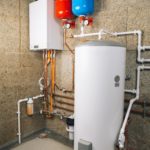7 Signs It’s Time for a New Water Heater
Published: October 26, 2017 / Last Updated: November 9, 2022

1. It Takes Forever to Get Hot Water
When you turn on your hot water faucet, you expect near-instantaneous hot water. With an ailing water heater, however, it could take minutes for hot water to flow out of the tap. Slow hot water delivery can be caused by a wide range of problems, including cumulative mineral and sediment buildup, worn components and issues with the burners or heating elements. If getting hot water involves playing the waiting game, then you’re better off replacing your water heater with a newer and more responsive unit.
2. You Can’t Get Any Hot Water at All
On the other hand, waiting a few minutes for hot water is usually better than not having any hot water at all. A broken heating element, faulty burner or even a bad relay can prevent your water heater from doing what it was built to do. If that happens on a regular basis, then it may be time for a complete replacement.
3. Muddy or Rusty Water Is the Norm
Water tinged with rust and/or sediment can make washing clothes, cleaning dishes and doing other ordinary activities difficult. After all, the last thing you need is rust stains on your clothing or a constant ring of sediment on your tub. It’s not unusual for water heaters to rust from the inside out, especially if the sacrificial anode hasn’t been replaced in a while. Heavy sediment buildup can also turn an otherwise pristine tank of hot water into a muddy mess. Although these problems can be taken care of with ordinary maintenance, persistent issues may warrant a water heater replacement. You should also check the rest of your plumbing system just to make sure other problems aren’t a contributing factor.
4. Your Water Heater Suffers Constant Leaks
Finding a puddle of water near your water heater can be worrying and annoying, especially if it happens on a regular basis. Water leaks can spring up due to failing water connections, a failed temperature and pressure relief valve or even pinhole leaks within the water tank itself. Depending on their size, water leaks can range from a minor annoyance to a major safety risk, especially if you have any nearby electrical hazards to worry about. Even a small water leak has the potential to escalate into major flooding if nothing’s done about it in time. Water leaks can also put your home at risk of developing mold and mildew issues. Before a minor leak turns into a major gusher, you may want to consider replacing your water heater.
5. Your Water Heater’s Become Noisier
Your water heater is designed to operate as quietly as possible. So when you start hearing pounding, rumbling, popping or crackling noises from it, it’s usually time to take notice. Most noises are caused due to unchecked mineral buildup, poor water flow or even a little condensation falling on the burner or heating element. Although a little routine maintenance can go a long way toward quieting your water heater, there may come a time when only a complete replacement can settle your noise woes.
6. The Repair Bills Are Adding Up
There’s no getting around the fact that water heater repairs cost money. The more frequent they become, the more expensive they can get. A sudden breakdown requiring an emergency service call can be particularly expensive, especially if you make several calls over the course of a single year. Although routine maintenance helps keep the cost of owning a water heater affordable, mounting problems can cause those costs to increase as your water heater ages. When the annual costs of fixing your current water heater approach the cost of installing a new water heater, it’s time to step back and think about a replacement.
7. It’s Over a Decade Old
Although it feels like it could be a permanent fixture in your home, your water heater actually has a finite life span. Most water heaters are designed to offer anywhere from 8 to 12 years of reliable service before a replacement’s needed. Of course, this life span could vary depending on upkeep, design and operating conditions. To be on the safe side, you should consider replacing your water heater once it’s hit the 10-year mark. If you have no idea how old your water heater is, then you should go ahead and replace it. Holding onto an aging water heater won’t save you much money in the long run; plus an energy-efficient replacement offers greater savings. Are you experiencing one or more of the above signs with your water heater? The experts at Magnolia Plumbing, Heating & Cooling can help you find the replacement that suits your needs.
Share This Article:
Request An Estimate
Contact us for a free estimate. It's just one form or phone call away!
Join Our Newsletter
Submit your email to receive promotions.
